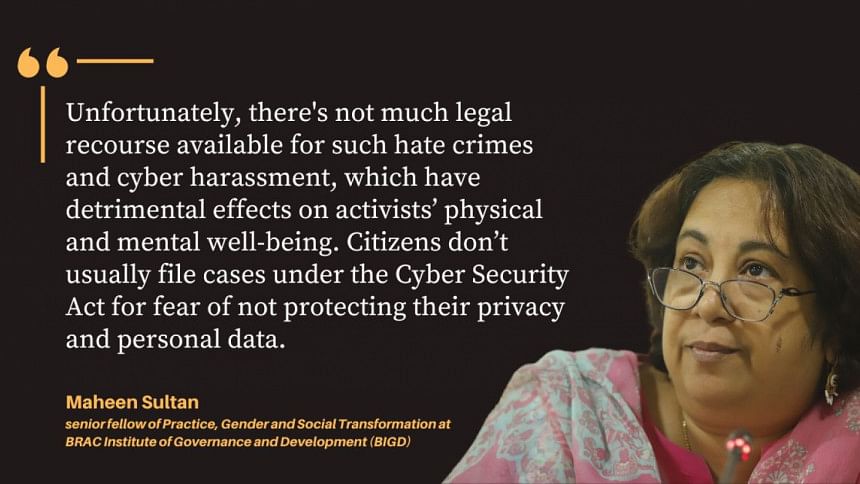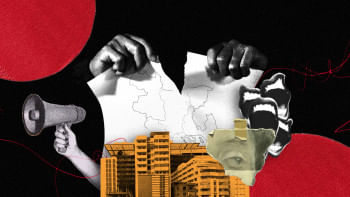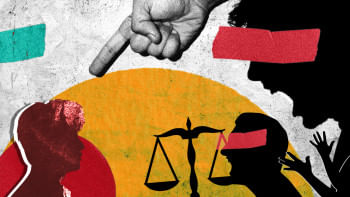'Government should not be swayed by the opinions of a small extremist minority'

In light of the recent removal of 'Sharifa's Tale' from the seventh-grade textbook, Maheen Sultan, senior fellow of Practice, Gender and Social Transformation at BRAC Institute of Governance and Development (BIGD), shares her insights with Tamanna Khan of The Daily Star on an ongoing study on the backlash against promoting comprehensive sexuality education (CSE) in Bangladesh.
What led you to explore the resistance against comprehensive sexuality education?
All over the world, we have been noticing a backlash against the progress made by the women's movement to ensure women's rights and gender equality, and measures taken by the government to protect and promote them. Our research team is part of a regional programme which includes four South Asian countries—India, Pakistan, Nepal and Bangladesh. In each country, we have chosen different case studies in areas where we think there has been very strong opposition to what women's movements are trying to achieve. For example, we looked at the case of rape law reform, child marriage, struggle for decent wages in the RMG sector and CSE as well.
The latest controversy with the Sharif-Sharifa text shows that teaching CSE is still a sensitive matter. Opposition to CSE is always not as visible or outspoken as it was in this case. However, it is very evident that teachers do not want to teach the curriculum, parents are often resistant, and people sometimes stigmatise teachers who teach these courses. There is a collective reluctance to talk about issues which go beyond health. Most people do not want to talk about issues surrounding sexual health, sexuality or access to contraception. They keep the discussions limited to reproductive health instead of talking about sexual and reproductive health and rights.
What's your reaction to the removal of "Sharifa's Tale" from the national curriculum?
Including Sharifa's story in the curriculum, I think, was a very positive step to try and introduce the concepts surrounding gender diversity. It was a well-researched piece of text. The idea was that students should be aware of the various gender identities and be more open to others who find themselves unable to fit into the binary identities of "boy" or "girl". The hope was that that teachers would introduce the topic sympathetically and sensitively.
The government in its policies is very open to sexual and reproductive health and rights (SRHR) and is committed to including CSE in the curriculum. However, it is sometimes scared of the reaction of people that it considers extremists. And often, it is only the most conservative people who get heard on social media. They have been loud enough for the authorities to hear them, but they might still be a minority in this matter. Most people might not have any issues with the text. So, the question remains whether the government should be swayed by the opinions of a small extremist minority.
People who have been opposing the text have said that it promotes homosexuality. This is a clear misrepresentation of the message of the story. Unfortunately, the government was influenced by this kind of reaction. I believe that the committee which took the final decision in this matter did not include a wide range of people with a diverse set of opinions. If more people had been consulted, perhaps the committee wouldn't have recommended removing the story from the curriculum.
Do organisations working to promote CSE receive threats of violence?
BRAC, Naripokkho, and Nagorik Uddyog are all part of the Right Here Right Now coalition that promotes CSE in schools and increased access to adolescent health services. The coalition also contributes to changing social and gender norms by developing influencers and mobilising the youth to interact with the local government authorities, teachers and schools to promote CSE. It has been very careful in not exposing the youth volunteers to any kind of risks. In their outreach programmes, they talk about reproductive health education and topics like menstrual health regulation, and access to services. They don't go around talking about sexual orientation and gender identity. Those topics are avoided because they know that they might face very strong reactions from the community, the authorities and the schools.
However, organisations that are more explicitly dealing with sexual orientation and gender identity have to be very careful. A lot of misinformation was spread on social media following the Sharif-Sharifa debacle. Both individuals and organisations were labelled and threatened for their work on sexual orientation and gender identity.
Unfortunately, there's not much legal recourse available for such hate crimes and cyber harassment, which have detrimental effects on activists' physical and mental well-being. Citizens don't usually file cases under the Cyber Security Act for fear of not protecting their privacy and personal data.
Why is it important to talk about CSE?
It is important because there is so much misinformation surrounding the issue. Adolescence is a period of life when young people are curious about their bodies. It is a period when they are discovering themselves and others, and they need to have access to the right kind of information regarding their sexuality and reproductive health. They need to know how to protect themselves. They need to understand the concept of consent and their rights to decide with whom, if and when to have a relationship, as well as the kind of relationship to have.
Another reason why CSE is so important and urgent is that we still have very high rates of child marriage. Early marriages lead to early pregnancies because young women don't have access to birth control and are discouraged from using it. Oftentimes, these pregnancies are unwanted and they resort to unsafe abortions.
When they cannot get abortions, they have to go through the process of childbirth when their bodies and minds are not ready for it. This leads to increased rates of maternal and child mortality. So, there are severe health-related consequences as well of ignoring CSE.
What is the way out?
Parents have to be involved in the process, so that they do not resist when their children receive CSE. If they understand what it is about, they are more likely to want schools to teach it. This would also lead to the eventual phasing out of the stigma surrounding the issue.
It is also important that youth leaders and volunteers with correct information and proper knowledge reach out to other young people. I think the youth are more likely to talk and listen to others in their age group. They will face fewer barriers there. Youth volunteers can also educate adults in their community to destigmatise the issue of CSE.
Views expressed in this article are the author's own.
Follow The Daily Star Opinion on Facebook for the latest opinions, commentaries and analyses by experts and professionals. To contribute your article or letter to The Daily Star Opinion, see our guidelines for submission.

 For all latest news, follow The Daily Star's Google News channel.
For all latest news, follow The Daily Star's Google News channel. 











Comments